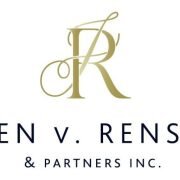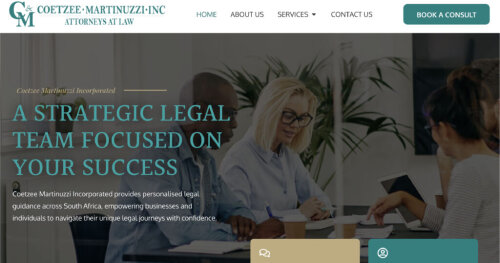Best Bankruptcy Lawyers in Centurion
Share your needs with us, get contacted by law firms.
Free. Takes 2 min.
List of the best lawyers in Centurion, South Africa
About Bankruptcy Law in Centurion, South Africa
Bankruptcy law in Centurion, South Africa is governed by national legislation, specifically the Insolvency Act 24 of 1936 and related statutes. In South Africa, "bankruptcy" primarily refers to personal insolvency, while companies undergo a different process called liquidation or business rescue. Bankruptcy involves the legal process where individuals who are unable to pay their debts can have their estate surrendered to the courts for orderly distribution amongst their creditors. The aim is to provide a fair process for creditors while allowing insolvent individuals to address overwhelming financial burdens and potentially start afresh in due course.
Why You May Need a Lawyer
Dealing with bankruptcy in Centurion is a complex legal procedure. You may find it necessary to seek professional legal advice or representation in several situations, including:
- When you are unable to pay your debts and face ongoing pressure from creditors.
- If you have been threatened with legal action such as a summons or garnishee order.
- When your assets risk being repossessed due to outstanding loans or debts.
- If you are considering voluntary surrender of your estate and want to ensure all legal requirements are met.
- To help you understand your rights and obligations during the bankruptcy process.
- When disputes arise regarding what assets can be included or protected from the bankruptcy estate.
- If you need advice on alternatives to bankruptcy, such as debt review or restructuring.
An experienced bankruptcy lawyer can help ensure you comply with all necessary procedures, avoid mistakes that may have serious legal or financial implications, and help you achieve the most favorable outcome possible.
Local Laws Overview
The core legislative framework for bankruptcy in Centurion, as in the rest of South Africa, is the Insolvency Act. Key aspects of local laws relevant to bankruptcy include:
- The distinction between voluntary surrender (initiated by the debtor) and compulsory sequestration (initiated by a creditor).
- Requirements for insolvency including proof that liabilities exceed assets and an inability to pay debts when they fall due.
- The process for surrendering an estate, which involves a court application, notification to creditors, and advertising in the Government Gazette and local newspapers.
- The appointment of a trustee or curator to manage the insolvent estate and oversee the sale of assets for the benefit of creditors.
- The protection of certain personal assets from the estate, depending on the circumstances and applicable exemptions.
- The impact of sequestration on your ability to enter into new credit agreements, act as a company director, or hold certain professions.
- The process and timeframes for rehabilitation, which allows the insolvent person to regain their legal status and potentially recover from bankruptcy.
Frequently Asked Questions
What is the difference between bankruptcy and insolvency in South Africa?
In South Africa, the term "bankruptcy" refers to the legal process of personal insolvency. "Insolvency" is a financial state where a person or business cannot pay their debts. The legal process for individuals is called sequestration, while businesses go through liquidation.
Who can apply for bankruptcy in Centurion?
Any natural person who is unable to pay their debts may apply for voluntary surrender of their estate in the High Court with jurisdiction over their area, such as Pretoria for Centurion residents. Creditors can also apply for compulsory sequestration against a debtor.
What are the main consequences of being declared bankrupt?
You may lose assets that are not exempt from the insolvent estate, will need to cooperate with the trustee, may be restricted from holding certain jobs or positions, and your ability to obtain credit will be limited until you are rehabilitated.
Can I keep any assets if I am declared bankrupt?
Some assets are protected or excluded from the insolvent estate, such as certain personal belongings and tools of trade, but each case depends on its particular circumstances. Legal advice can help clarify what you may be allowed to retain.
What debts are included in bankruptcy?
Most unsecured debts such as credit card debt, medical bills, and loans are included. Some debts, like maintenance obligations and certain fines, may not be discharged through bankruptcy.
How long does bankruptcy last in Centurion?
Bankruptcy, or sequestration, typically lasts until you are rehabilitated. You may apply for rehabilitation after a set period, usually after four years, or sooner in some circumstances by court order.
Can my spouse be affected by my bankruptcy?
If married in community of property, your spouse's assets may also fall within the insolvent estate. If married out of community of property, generally only the insolvent spouse's assets are affected, but some exceptions may apply.
Is it possible to avoid bankruptcy?
Yes, there are alternatives such as negotiating with creditors, entering into a debt review, or applying for administration, depending on your level of debt and income.
What is the cost of filing for bankruptcy in Centurion?
Costs can vary, including legal fees, court costs, and fees deducted from the insolvent estate. Consulting with a bankruptcy attorney will provide a more accurate estimate based on your situation.
When can I apply for rehabilitation after bankruptcy?
You may apply for rehabilitation after four years from the date of sequestration, or earlier if certain conditions set out in the Insolvency Act are met. Rehabilitation restores your legal status to that of a solvent person.
Additional Resources
If you are considering bankruptcy or need further guidance in Centurion, the following resources are available:
- Department of Justice and Constitutional Development - Provides information on sequestration and insolvency procedures.
- National Credit Regulator (NCR) - Offers guidance on consumer protection and debt counseling, including alternatives to sequestration.
- Legal Aid South Africa - Offers subsidized or free legal advice to qualifying individuals in need of bankruptcy or debt-related legal assistance.
- South African Law Society - Can assist in locating a qualified insolvency lawyer in Centurion.
- Pretoria High Court - Handles insolvency matters for Centurion residents.
Next Steps
If you are facing unmanageable debt or legal action from creditors, consider the following steps:
- Gather all documentation relating to your debts, income, and assets.
- Consult a qualified bankruptcy or insolvency lawyer in Centurion to assess your financial situation and explain your options.
- Consider alternatives such as debt review or payment plans, if appropriate.
- If bankruptcy is the best solution, your lawyer will help you prepare and submit the necessary court applications.
- Cooperate fully with your attorney and the appointed trustee throughout the process.
- After sequestration, follow all legal requirements and keep detailed records to facilitate your future rehabilitation application.
Taking early action and seeking professional legal guidance can help protect your rights, minimize the impact of debt, and put you on the path to financial recovery.
Lawzana helps you find the best lawyers and law firms in Centurion through a curated and pre-screened list of qualified legal professionals. Our platform offers rankings and detailed profiles of attorneys and law firms, allowing you to compare based on practice areas, including Bankruptcy, experience, and client feedback.
Each profile includes a description of the firm's areas of practice, client reviews, team members and partners, year of establishment, spoken languages, office locations, contact information, social media presence, and any published articles or resources. Most firms on our platform speak English and are experienced in both local and international legal matters.
Get a quote from top-rated law firms in Centurion, South Africa — quickly, securely, and without unnecessary hassle.
Disclaimer:
The information provided on this page is for general informational purposes only and does not constitute legal advice. While we strive to ensure the accuracy and relevance of the content, legal information may change over time, and interpretations of the law can vary. You should always consult with a qualified legal professional for advice specific to your situation.
We disclaim all liability for actions taken or not taken based on the content of this page. If you believe any information is incorrect or outdated, please contact us, and we will review and update it where appropriate.









